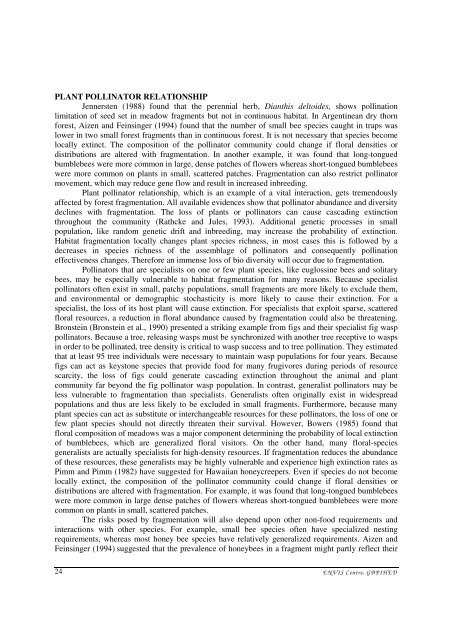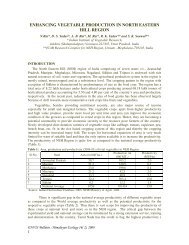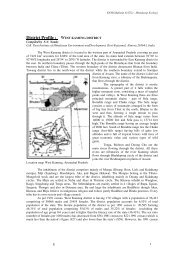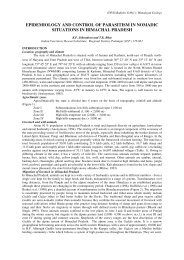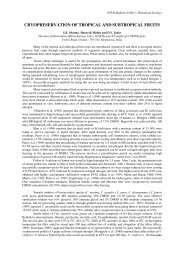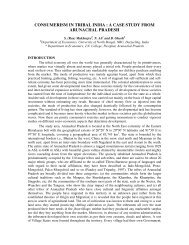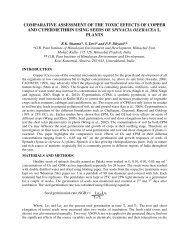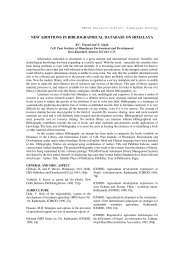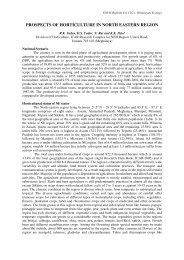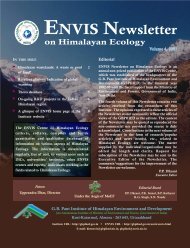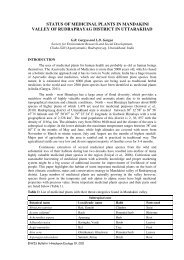ENVIS BULLETIN - ENVIS Centre on Himalayan Ecology
ENVIS BULLETIN - ENVIS Centre on Himalayan Ecology
ENVIS BULLETIN - ENVIS Centre on Himalayan Ecology
Create successful ePaper yourself
Turn your PDF publications into a flip-book with our unique Google optimized e-Paper software.
PLANT POLLINATOR RELATIONSHIPJennersten (1988) found that the perennial herb, Dianthis deltoides, shows pollinati<strong>on</strong>limitati<strong>on</strong> of seed set in meadow fragments but not in c<strong>on</strong>tinuous habitat. In Argentinean dry thornforest, Aizen and Feinsinger (1994) found that the number of small bee species caught in traps waslower in two small forest fragments than in c<strong>on</strong>tinuous forest. It is not necessary that species becomelocally extinct. The compositi<strong>on</strong> of the pollinator community could change if floral densities ordistributi<strong>on</strong>s are altered with fragmentati<strong>on</strong>. In another example, it was found that l<strong>on</strong>g-t<strong>on</strong>guedbumblebees were more comm<strong>on</strong> in large, dense patches of flowers whereas short-t<strong>on</strong>gued bumblebeeswere more comm<strong>on</strong> <strong>on</strong> plants in small, scattered patches. Fragmentati<strong>on</strong> can also restrict pollinatormovement, which may reduce gene flow and result in increased inbreeding.Plant pollinator relati<strong>on</strong>ship, which is an example of a vital interacti<strong>on</strong>, gets tremendouslyaffected by forest fragmentati<strong>on</strong>. All available evidences show that pollinator abundance and diversitydeclines with fragmentati<strong>on</strong>. The loss of plants or pollinators can cause cascading extincti<strong>on</strong>throughout the community (Rathcke and Jules, 1993). Additi<strong>on</strong>al genetic processes in smallpopulati<strong>on</strong>, like random genetic drift and inbreeding, may increase the probability of extincti<strong>on</strong>.Habitat fragmentati<strong>on</strong> locally changes plant species richness, in most cases this is followed by adecreases in species richness of the assemblage of pollinators and c<strong>on</strong>sequently pollinati<strong>on</strong>effectiveness changes. Therefore an immense loss of bio diversity will occur due to fragmentati<strong>on</strong>.Pollinators that are specialists <strong>on</strong> <strong>on</strong>e or few plant species, like euglossine bees and solitarybees, may be especially vulnerable to habitat fragmentati<strong>on</strong> for many reas<strong>on</strong>s. Because specialistpollinators often exist in small, patchy populati<strong>on</strong>s, small fragments are more likely to exclude them,and envir<strong>on</strong>mental or demographic stochasticity is more likely to cause their extincti<strong>on</strong>. For aspecialist, the loss of its host plant will cause extincti<strong>on</strong>. For specialists that exploit sparse, scatteredfloral resources, a reducti<strong>on</strong> in floral abundance caused by fragmentati<strong>on</strong> could also be threatening.Br<strong>on</strong>stein (Br<strong>on</strong>stein et al., 1990) presented a striking example from figs and their specialist fig wasppollinators. Because a tree, releasing wasps must be synchr<strong>on</strong>ized with another tree receptive to waspsin order to be pollinated, tree density is critical to wasp success and to tree pollinati<strong>on</strong>. They estimatedthat at least 95 tree individuals were necessary to maintain wasp populati<strong>on</strong>s for four years. Becausefigs can act as keyst<strong>on</strong>e species that provide food for many frugivores during periods of resourcescarcity, the loss of figs could generate cascading extincti<strong>on</strong> throughout the animal and plantcommunity far bey<strong>on</strong>d the fig pollinator wasp populati<strong>on</strong>. In c<strong>on</strong>trast, generalist pollinators may beless vulnerable to fragmentati<strong>on</strong> than specialists. Generalists often originally exist in widespreadpopulati<strong>on</strong>s and thus are less likely to be excluded in small fragments. Furthermore, because manyplant species can act as substitute or interchangeable resources for these pollinators, the loss of <strong>on</strong>e orfew plant species should not directly threaten their survival. However, Bowers (1985) found thatfloral compositi<strong>on</strong> of meadows was a major comp<strong>on</strong>ent determining the probability of local extincti<strong>on</strong>of bumblebees, which are generalized floral visitors. On the other hand, many floral-speciesgeneralists are actually specialists for high-density resources. If fragmentati<strong>on</strong> reduces the abundanceof these resources, these generalists may be highly vulnerable and experience high extincti<strong>on</strong> rates asPimm and Pimm (1982) have suggested for Hawaiian h<strong>on</strong>eycreepers. Even if species do not becomelocally extinct, the compositi<strong>on</strong> of the pollinator community could change if floral densities ordistributi<strong>on</strong>s are altered with fragmentati<strong>on</strong>. For example, it was found that l<strong>on</strong>g-t<strong>on</strong>gued bumblebeeswere more comm<strong>on</strong> in large dense patches of flowers whereas short-t<strong>on</strong>gued bumblebees were morecomm<strong>on</strong> <strong>on</strong> plants in small, scattered patches.The risks posed by fragmentati<strong>on</strong> will also depend up<strong>on</strong> other n<strong>on</strong>-food requirements andinteracti<strong>on</strong>s with other species. For example, small bee species often have specialized nestingrequirements, whereas most h<strong>on</strong>ey bee species have relatively generalized requirements. Aizen andFeinsinger (1994) suggested that the prevalence of h<strong>on</strong>eybees in a fragment might partly reflect their24E N V IS C entre, G B P IH E D


